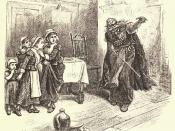"The belief in a supernatural source of evil is not necessary; men alone are quite capable of every wickedness." - Joseph Conrad
The Salem witchcraft trials illuminate a great human campaign to rid society of the wicked devil and his sinful messengers. However nobly intended, these trials create an era of fear and hysteria, generating an outlet for the evil persons of Salem to raise their reputations at the expense of the good. In effect, it becomes apparent that the accusers do not possess a power to prove another of a "Satanic alliance", but rather branch their motivations from ambition, a theory probed by Arthur Miller's play The Crucible. Afraid of the severe penalties for secretly dancing in the forest and chanting spells, characters such as Tituba and Abigail Williams accuse others of witchcraft for their self-preservation. Capitalizing on this newly acquired power, Abby's self-preservation transforms into a strong desire to do harm unto others and quench her great lust for power.
Moreover, other individuals such as Thomas Putnam endanger the lives of others simply to satisfy their insatiable greed and self-interest. As a result, the accusers in the witchcraft trials become the embodiment of sin, fed by their varied ambitions.
Ironically enough, because Salem's stern religious ethic controls all aspects of society and promotes safeguards against all immoralities and sins, the townspeople are somewhat provoked to test these prevailing social values. This becomes the case with a group of young girls lead by Abigail Williams and Tituba, who secretly dance "like heathen in the forest" (1 10) and "conjure upShdeadShspirits" (1 16), all tell-tale elements of witchery. Soon enough however, rumors spread and "the whole country's talkin' witchcraft", a definite "hangin' error" (1 19). Terrified, the girls entrap themselves in an atmosphere of hysteria and apprehension searching for the...


